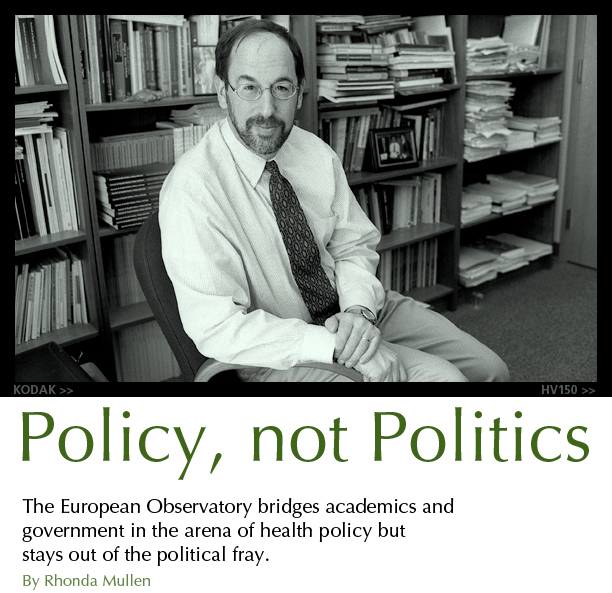












|
 |
| |
|
|
| |
 ichard
Saltman has to be ready at a moment’s notice to pack a bag,
hop a plane, and take his health policy expertise on the road. At
WHO’s bidding, he has whisked off to Kazakhstan to encourage
the government to reverse a sudden decision to privatize the health
care system. On a recent request from Tony Blair’s government,
he attended a vetting seminar for a new white paper on primary care
in England. In fact, in the past few months, he’s been to
England, Bosnia, and Russia to offer policy analyses of health systems
in those countries. ichard
Saltman has to be ready at a moment’s notice to pack a bag,
hop a plane, and take his health policy expertise on the road. At
WHO’s bidding, he has whisked off to Kazakhstan to encourage
the government to reverse a sudden decision to privatize the health
care system. On a recent request from Tony Blair’s government,
he attended a vetting seminar for a new white paper on primary care
in England. In fact, in the past few months, he’s been to
England, Bosnia, and Russia to offer policy analyses of health systems
in those countries.
Saltman now has been exploring health
policy questions for 25 years through two Fulbright fellowships,
as a research director of the European Observatory on Health Systems
and Policies, and through appointments at Harvard and the London
School of Economics and Political Science and as professor of health
policy at the Rollins School of Public Health (RSPH). His experiences
have led to a firm belief that although people of diverse countries
“imagine the world differently,” they still can learn
from each other in making good health policies. He sees a clear
connection between culture and health decisions.
“Despite globalization, the
societal norms that drive the process of health care decision-making
are not converging,” says Saltman. While many countries have
adopted health care tools that function similarly, such as diagnosis-related
groups (DRGs), that similarity exists only at a mechanical level.
By contrast, countries remain broadly fixed in the value systems
that ultimately influence health care decisions. The intersection
of these cultural norms and health care decisions raises interesting
questions for Saltman.
For example, national policy makers
across Europe agree in principle that primary care should be the
linchpin of a well-designed health care system. However, those principles
fail to carry over into the organizational mechanisms best suited
to achieving that common objective. Across Western, Central, and
Eastern Europe, primary care is delivered through widely ranging
institutional, financial, professional, and clinical configurations.
Primary Care in the Driver’s Seat?, edited by Saltman,
Ana Rico, and Wienke Boerma, studies the reforms of primary care
in Europe and their impact on the broader coordination mechanisms
of European health care systems. |
|
| |
|
|
 |
| |
|
|
| |
The
book is part of a series produced by the European Observatory on
Health Systems and Policies, a project that promotes evidence-based
health policy-making through comprehensive and rigorous analysis
of health care systems in Europe. Saltman describes the Observatory—with
its partners of WHO, the World Bank, seven European governments,
and others—as a bridge between academe and government. “An
academic might spend three years on one narrow topic and have the
research perfected before publishing,” he says, “whereas
a policy maker doesn’t care about perfect. He or she wants
three good options to introduce to a cabinet now.”
The Observatory grew out of a 1996
conference that gathered ministers of health from across Europe
to discuss health sector reform. Saltman and co-author Josep Figueres
published the conference findings in two critical books: European
Health Care Reform, which remains a best-selling volume published
by WHO, and Critical Challenges for Health Care Reform in Europe,
which was named the best book for health care analysis in 1999 by
the European Healthcare Management Association.
With a current staff of 25 and a $5 million operating budget, the
Observatory synthesizes lessons from current literature and develops
policy options for decision makers. “Our job is not to recommend,”
Saltman says. “We stop at the policy lessons and options.
We do the research and thinking, but we don’t get mixed up
with the political side. Implementation is an important ingredient,
but that’s not our job.”
The Observatory disseminates information
through publication of book series, country profiles, and policy
briefs and also hosts workshops and seminars to provide a forum
for policy makers to share experiences and discuss potential reforms.
The Health in Transition series provides comparative information
on health care systems and reform initiatives in countries throughout
Europe. (A former Humphrey Fellow at the RSPH, Vaida Bankavskaite,
is currently updating books on health systems in Spain, Sweden,
and Denmark.) Recent titles from another series have examined social
health insurance, pharmaceutical costs, and European Union enlargement.
The policy briefs highlight policy lessons that are easily accessible
to health care ministers and other policy makers.
Despite the many trips to Europe and
multiple publications in process, Saltman has never missed a scheduled
class at the RSPH in Atlanta. In the fall, he teaches the capstone
course for the health policy track, and each spring he teaches a
course on comparative health systems. Students get a syllabus at
the beginning of the semester with 13 sessions but flexible dates.
In return for their flexibility, students gain by having instruction
from someone at the epicenter of evaluating the very latest in health
policy decisions throughout the world. |
|
| |
|
|
| |
|
|
|
|
|
|



